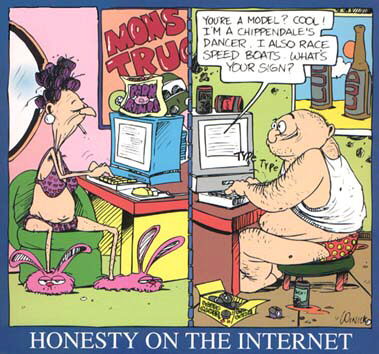| Who's Real | 2002-09-21 22:12 7 comments |
 by Flemming Funch by Flemming FunchA concern for any virtual community space is how we can verify whether people are who they say they are, or whether we even care if anybody is who they say they are. If people can just go and create a profile by filling in a name and an e-mail, we're not really going to be sure who they are at first, beyond what they say. They might create several accounts and pretend to be different people. We can of course make more stringent criteria for opening new accounts. For example, that one has to be referred by some already known person, and that one has to fill in a considerable amount of information about oneself, and somebody has to examine that and approve the application. But it still comes down to something more fundamental. Community doesn't happen just because some people fill in profiles, even if they do it correctly and truthfully. Community is something that happens between specific people, not something that can be automated in a database. In that vein it would be somewhat misleading to call something like the New Civilization Network "a community". It is not a community, virtual or not. It is a space where community might happen, and it is a place where one can set up virtual communities, i.e. online groups that people choose to belong to, in order to accomplish some particular aim in some mutually agreeable manner. So, how does it matter whether people are real or fake online? Well, it depends on the purpose. If the point is just online socializing and nothing else, it might not matter. It might for that matter be more interesting if you could make up fake personalities at will. But in any setting where we expect people to possibly work together on real projects, it is a different matter. If one was going to enter into a business-like relationship with somebody else, it would be fair to demand that one could identify and verify each other's identity to some degree. Knowing their address, phone number, etc., and being able to talk with them over the phone or in person. Personally, for many kinds of collaboration, I don't so much care whether they really give their real name, as I care what their track record is. I care about whether other people know them, whether other people trust them, whether other people have had successful interactions with them in the past. One of the mast successful trust tracking systems online is at eBay. Buyers and sellers in online auctions will usually file feedback on each other. So I can come along later and decide to trust somebody based on their previous track record. And it works well. Millions of private people are sending each other money in advance for unseen products, with no legal guarantee of getting what they're paying for. But the fraud is minimal, exactly because of the feedback and rating system. And that is despite that you might not know anything more about each other than an online handle. I think the value of a network or a community is in the trust relations that are established. Database software can help store that, but will not be able to figure it out by itself. So, the question is really how best to create features that allow trust to be recorded, without those features themselves being misused. Asking for people to be sponsored or recommended by known members in good standing, before or after accepting their profile, is one way. Asking people to record their relationship with others is one way. However, if it isn't based on well-defined transactions it is open to misuse. If nothing much is at stake, some people will vouch for just about anybody, just because they're in a good mood or they smiled at them or something. We can pay particular attention to who have met each other in person. If somebody has been to their house, that says a good deal about whether the person is real or not. Feedback and track record in relation to some kind of transaction is possibly more reliable. If something is bought and sold, something is at stake, and people are likely to give fairly correct feedback. All of this is ultimately just information. If we can require and store and elicit the right kind of information, and enough of it, we might have a virtual picture of each other that we can use for something. My preferred approach would be that anybody would be allowed a virtual identity, no matter how thin it is, but that we would relate to that identity differently depending on how well developed and well verified and well trusted that identity is. For NCN the practical compromise solution currently is that new members are screened by a human and obvious extra accounts for existing members are rejected, as are accounts that refuse to give proper information, such as (presumably) teenage boys who enter "Fuck You" or "None of your business" as their name. But people who just enter a single name or a new age name, like "Starbright" would be accepted. And from then on, the hope is for the web-of-trust system to work. Members can flag other members as acquaintances, friends or comrades (people you trust unconditionally). All of that has room for improvement of course. The way I see it, people become more real the more information we get from them, and the more different channels of information we see, and the more history there is, and the more these things are cross-referenced with other people |